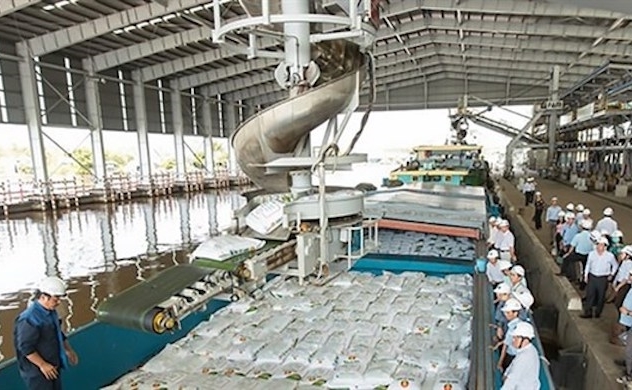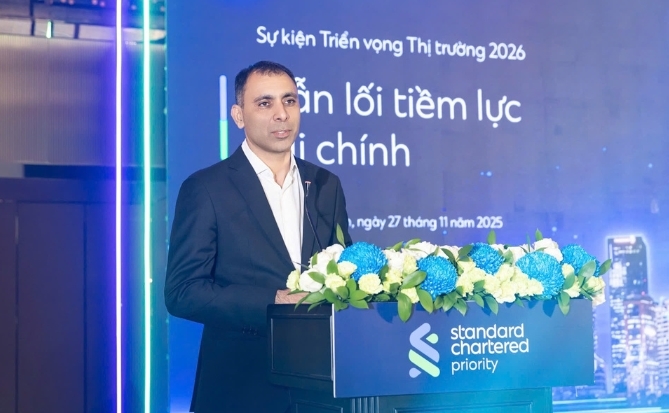Fertiliser businesses see profit drop on ailing selling prices and rising costs

Fertiliser products of Petrovietnam Ca Mau Fertiliser JSC (DCM) being processed. Photo courtesy of DCM.
Urea prices down 30-40%
Fertiliser prices have fallen sharply since the fourth quarter of 2022. Profits of the fertiliser businesses in the fourth quarter of 2022 decreased deeply, with some companies even recording losses, although the profits in the whole year 2022 still grew at high rates. Plunging profits continued in the first quarter of 2023.
In Q1 this year, Petrovietnam Ca Mau Fertiliser Joint Stock Company (DCM) recorded a 33% decrease in revenue and an 85% decrease in profit after tax compared to the same period in 2022, to reach 2.73 trillion VND and 229 billion VND, respectively. This was the lowest profit in the last seven quarters.
According to DCM, the average selling prices of urea in the first quarter of 2023 decreased by more than 32% year-on-year, and the increase in selling expenses were the two main reasons for the decline in profits.
At the end of the first quarter of 2023, Petrovietnam Fertiliser and Chemicals Corporation (DPM) recorded revenue of 3.29 trillion VND, down 44%; profit after tax reached 262 billion VND, down 87.6% year-on-year.
DPM said that in the first quarter of 2023, the output of fertiliser trading products decreased, especially the selling price of urea decreased by 44%. Besides, the higher gas prices in the same period led to a decrease in the sales of commodities, which resulted in a corresponding fall in profits (gas accounts for a large proportion of the cost of producing ammonia, a key raw material for fertiliser production).
Binh Dien Fertiliser Joint Stock Company (BFC) lost more than 39 billion VND in the first quarter of 2023, while revenue decreased by 48% over the same period last year, reaching only 1.36 trillion VND.
BFC said that in the first quarter of 2023, the company actively reduced selling prices, making gross profits decrease by more than 73%; sales volume fell by more than 85,000 tonnes, equivalent to a drop of 52% over the same period last year. This led to a deep fall in profits, although the company actively reduced administrative expenses and selling expenses, respectively, by 51% and 44%.
General Director of BFC Ngo Van Dong said that in the first quarter of 2023, fertiliser prices fell sharply and quickly, so fertiliser agents only ordered fertiliser products according to actual consumption needs, not storing products in warehouses as before. Therefore, the company's output and selling price did not meet expectations.
Vietnam's fertiliser exports from the beginning of 2023 have been under strong competitive pressure as the supply from Russia and China increases. According to the General Department of Customs, in the first four months of 2023, Vietnam exported over 537,200 tonnes of fertiliser, bringing in 232.16 million USD, down 17% in volume and 43.6% in value over the same period of 2022.
The decrease in demand and the increase in inventories led to a sharp drop in domestic urea prices. Urea prices in April and May 2023 decreased by 30-40% over the same period last year.
Careful plan
MB Securities (MBS) said that the policy of restricting the export of fertilisers of Russia and China has been relaxed or is about to expire, causing an increase in fertiliser supply and a decrease in fertiliser prices. Fertiliser prices may decrease and world oil prices also tend to correct.
In that context, fertiliser manufacturing and trading companies have cautiously planned their business for 2023.
Ha Bac Fertilisers and Chemicals Joint Stock Company (DHB) expects that in 2023, revenue will reach 4.6 trillion VND, profit after tax will total 931 billion VND, down 28% and 47.6% respectively, compared to the performance in 2022.
DPM expects to achieve revenue of 17.3 trillion VND in 2023, profit after tax of 2.25 trillion VND, down 8.6% and nearly 60%, respectively, compared to the level in 2022. Considering that market demand tends to decrease, DPM's Phu My Fertiliser plant plans to reduce production output to balance consumption capacity.
MBS predicts that DPM's business results in 2023 may not meet its plan, likely to achieve revenue of only 15.12 billion VND, profit after tax of 2.18 trillion VND.
Binh Dien Fertiliser plans to achieve revenue of 7.48 trillion VND, profit before tax of 220 billion VND, down 12% in revenue but up 18.5% in profit compared to last year's performance.
Analysts say that fertiliser prices will continue to decline in the first months of 2023, but will soon stabilise again due to reduced inventories and increased demand for soil nutrients. When fertiliser prices fall, farmers will buy more fertilisers to supplement soil nutrients after a limited period because of high prices in the previous two years.
Source: Vietnamplus

 TIẾNG VIỆT
TIẾNG VIỆT 

_131447820.png)














